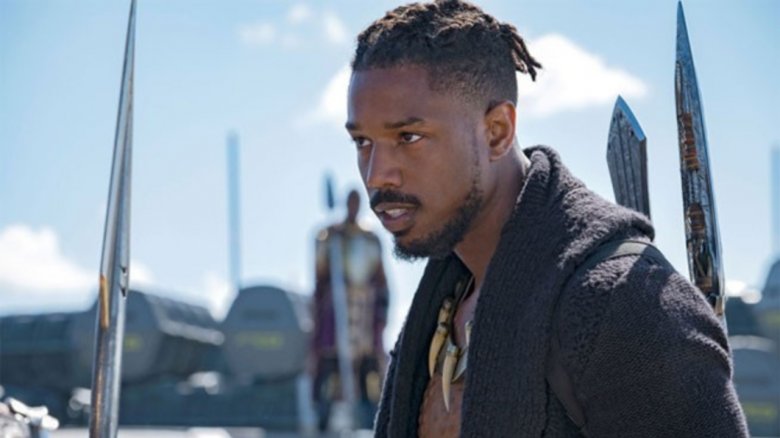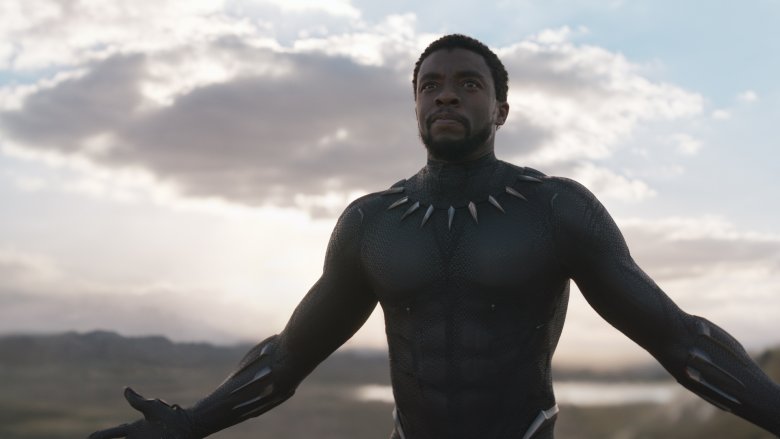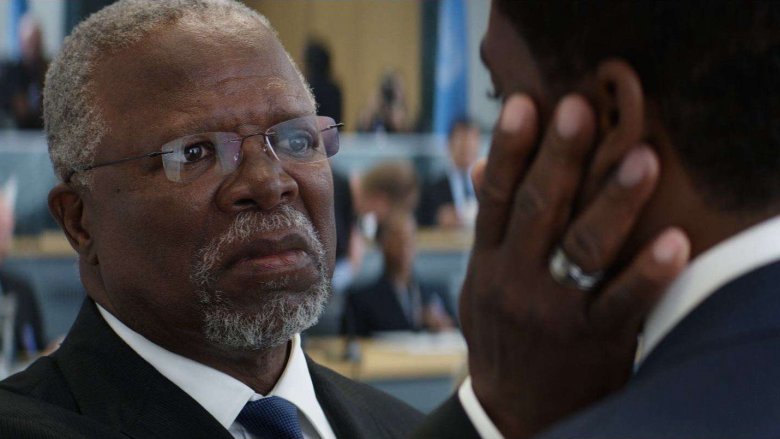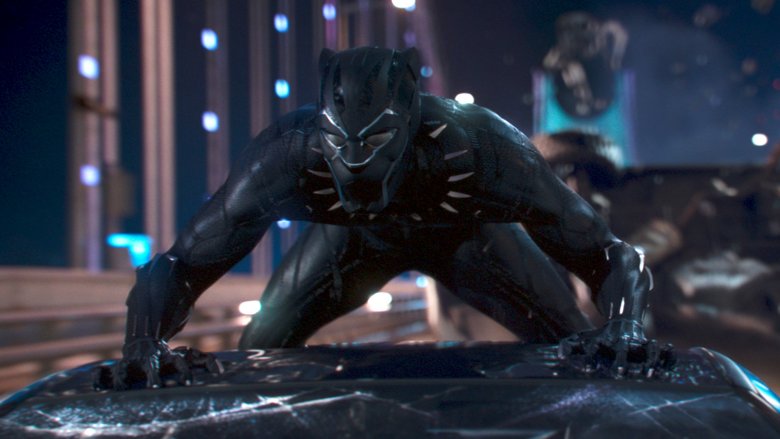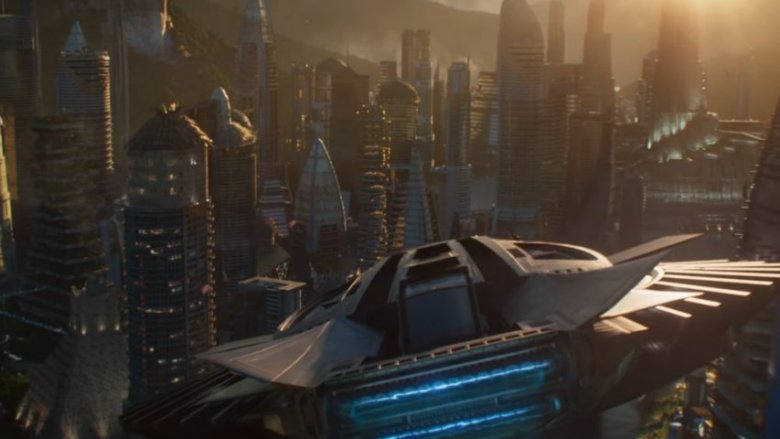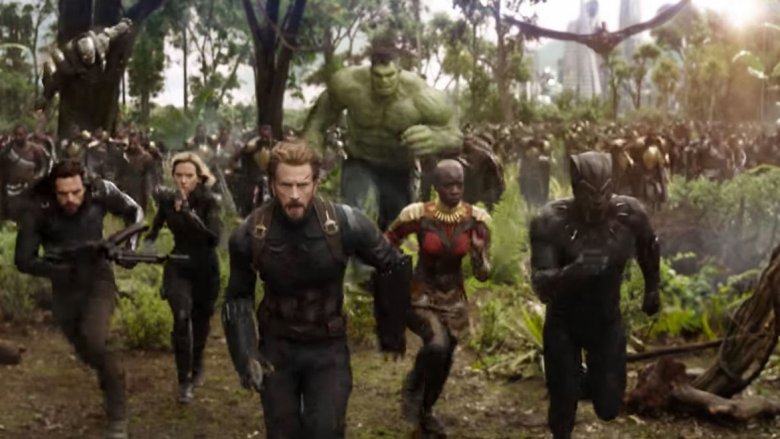Biggest Unanswered Questions In Black Panther
The biggest question leading into the release of Marvel's superhero blockbuster Black Panther was: can it possibly live up to the massive amount of hype? Well, that question has been answered with a resounding yes, as millions of ecstatic fans around the world can attest. But as great as the film is, there are some other questions it never quite got around to addressing. So grab your vibranium and hold on tight, because here's a spoiler-filled look at the biggest unanswered questions in Black Panther.
Why didn't they bring the kid to Wakanda?
The moral debate at the center of the film is whether or not Wakanda should continue to hide its true nature from the world and pursue isolationist policies to the detriment of people they could help — or if they should open their borders and become a beacon of hope to the underprivileged. This question is played out through the history of the antagonist, Erik "Killmonger" Stevens (Michael B. Jordan), whose father N'Jobu (Sterling K. Brown) was killed by T'Challa's father, the former king of Wakanda, T'Chaka (John Kani). Oh, and Erik's dad also happened to be T'Chaka's brother, making Erik and T'Challa cousins. It's a tragic tale, made much worse by King T'Chaka's decision to leave his young nephew Erik behind after killing N'Jobu, making him an orphan on the streets of Oakland rather than bringing him back to Wakanda after his father's death.
It's a decision that shatters T'Challa when he finds out decades later, and it certainly helped perpetuate the cycle of violence Erik becomes trapped in. But why exactly did T'Chaka leave his nephew behind? It's claimed that he didn't want to risk exposing Wakanda's secrets to the wider world, but how exactly would bringing one orphaned kid into the country threaten the nation's security? It seems as though nobody would have missed him in Oakland, and it's not like the 8-year-old Erik was secretly an undercover Vice reporter. We assume he had some actual reason for leaving Erik behind, but if he did, it wasn't mentioned in the movie.
Is this the end of the Black Panther legacy?
In a pivotal scene, after Killmonger becomes the new king of Wakanda, he orders the botanists in the garden of heart-shaped herbs to burn the country's entire supply of the magic plant that gives their monarchs the power of the Black Panther. That raises, well, a whole bunch of questions. Does this mean T'Challa is the last Black Panther, and that the legacy will end with him? It would seem so, unless, of course, some of the flowers escaped the destruction — which we know is possible, since Nakia (Lupita Nyong'o) just grabbed one and scampered off with it and nobody noticed. Or is there another garden, perhaps? During the film's opening scene, which explains the origin of the nation and the Black Panther's powers, it says the ancient vibranium meteor that landed in Wakanda mutated the plant life. Since the vibranium is still there, it stands to reason that more of these mutated plants could be created, either on purpose or accidentally, in order to restore the Panther legacy to future generations.
Honestly, we just don't know enough about how exactly the whole Black Panther thing works to begin with to figure out the answers to these questions. Which brings us to...
Just how does the whole Black Panther thing work?
So, according to Black Panther, the powers of the Panther goddess Bast are bestowed upon the reigning monarch of Wakanda after he (or she?) eats the magic heart-shaped herb. Then the monarch is buried alive while their spirit travels to the afterlife to commune with the spirits of their ancestors, before being reborn as...the Black Panther!
Which is great, except that raises far more questions than it answers. Primary among them is this: if T'Challa didn't go through the ritual until returning home following his father's death, how did he have the power of the Black Panther in Captain America: Civil War? Shouldn't his father have still been Black Panther? And if all the heart-shaped herbs are kept in the sacred garden for the induction of the next monarch, how did he become Black Panther while he was off in Vienna at the conference where his father died? Does someone carry an emergency herb with them to be administered to the heir apparent in case of an assassination?
It makes more sense to assume T'Challa had already assumed the mantle of the Black Panther before becoming king, but that opens up a whole new pack of questions. Is there some sort of genetic component, so only members of the royal family can become the Black Panther? Or can anyone become the Black Panther if the king assigns them the role?
This is one area where we're more confused than we were when we went in.
Does every Marvel hero need a super suit?
Black Panther possesses inhuman speed, agility, strength, and stamina, bestowed upon him (apparently) by the goddess Bast (somehow). Yet over the course of Black Panther, most of the major butt-kicking moves he pulls off during the fight scenes are possible because he's wearing a technologically advanced super suit. He deflects bullets, sonic blasts, and grenades with it, then discharges the kinetic energy absorbed by the suit, causing huge blasts that wreck cars, crash planes, and get audiences cheering. Why, it's almost as cool as if we were watching Iron Man 4!
But does, like, every single Marvel hero need to have a super suit? Sure, it's fine for Iron Man. And Ant-Man. And the Wasp. And the Falcon's cool suit allows him to fly. But does Spider-Man really need a technologically advanced super-suit with an AI interface? Does Black Panther need a suit to do all his fighting for him? It's ironic that the most compelling and gripping fights in the movie were the ritual challenges when everyone was stripped of their powers and their gizmos. So why does Marvel insist on giving everyone these super suits?
How does Wakanda function?
We learn in Black Panther that Wakanda has been isolated for centuries, perhaps even millennia, all while secretly developing amazing futuristic technology. But how does the society actually function? Sure, they have this one amazing resource in abundance that nobody else has, not to mention some magic plants and a guy dressed like a cat. But you can't build everything out of vibranium. There are other resources and supplies needed to construct a massive futuristic city, but considering Wakanda has convinced the rest of the world they're poor farmers, it doesn't seem as though they would have established trade with other nations to get everything else they need. Plus, even if they did, what could they trade? They don't want to lose any vibranium at all, clearly, but what else do they have to offer?
They obviously have a ton of money — enough to fund their city, not to mention setting up secret spy headquarters around the world. But where did they get this money from, if not trading vibranium? And why, exactly, do they have packs of soldiers — war dogs — secretly planted all over the world if they're such a peaceful nation, and only want to remain secret, safe, and hidden?
It sure seems like something else is going on, but the movie never really shows us what.
Now what?
Maybe the biggest question left unanswered from Black Panther is one they never intended to answer. Namely, now what? We know from the trailer to Avengers: Infinity War that Thanos is going to attack Wakanda — presumably because an Infinity Stone is there or ends up there. We also know from the trailer that Captain America and a team of Avengers are on hand in Wakanda when this happens. So how does that all come about? And what's going to happen to T'Challa and Wakanda? Is their big push to become an open nation, sharing with the world, going to end before it even starts? Or are they just going to be left sharing a huge pile of rubble?
It seems there's only one way to find out, and all we can say is that we can't wait to see what unanswered questions are still left after we watch Avengers: Inifinty War — and Black Panther 2.
